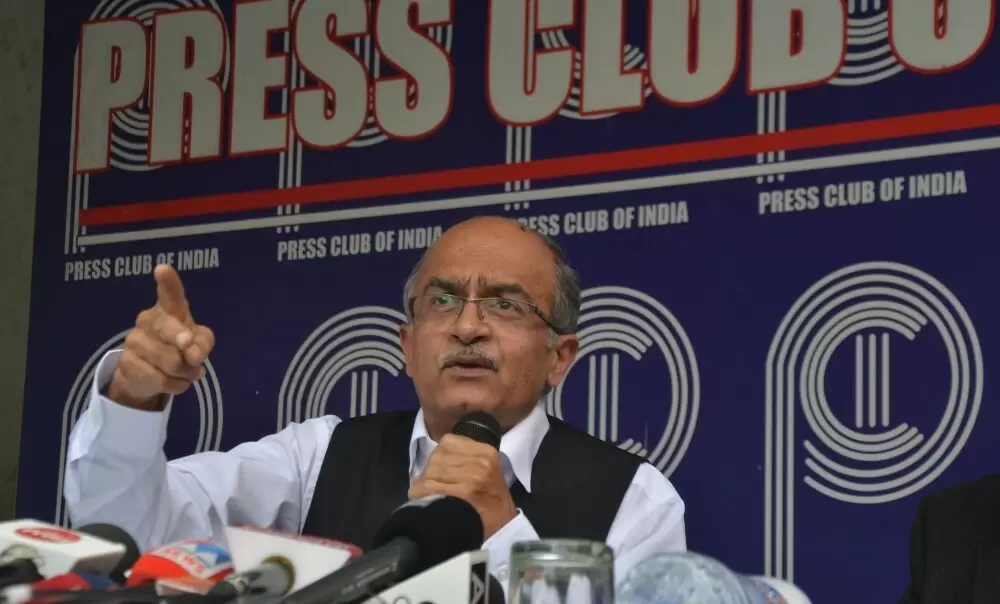Ahead of contempt hearing, Bhushan challenges validity of 'criminal contempt'
New Delhi
01-August-2020

Photo: IANS
Senior journalist N. Ram, former Union Minister Arun Shourie and activist-lawyer Prashant Bhushan have moved the Supreme Court challenging the constitutional validity of Section 2(c)(i) of the Contempt of Courts Act and termed it as a violation of the Articles 19 and 14 of the Constitution.
On July 22, the top court issued notices to Bhushan and Twitter Inc for his tweets allegedly scandalising the judiciary.
Two days later, a bench headed by Justice Arun Mishra decided to begin hearing on another contempt case against Bhushan pending since 2009. The two cases will be taken up for hearing on August 4 and 5.
The petitioners argued that this sub-section is unconstitutional, as it is incompatible with preambular values and basic features of the Constitution, and violates Article 19(1 )(a). They claimed the sub-section is unconstitutionally and incurably vague, and is manifestly arbitrary.
The Section 2(c)(i) of the Contempt of Courts Act, 1971, defines 'criminal contempt' as publication of anything - whether by words, spoken or written, or by signs, or by visible representation, or otherwise of any matter or the doing of any other act whatsoever - which scandalises or tends to scandalise, or lowers or tends to lower the authority of any court.
The petitioners have asked the top court to issue directions declaring Section 2(c)(i) of the Contempt of Courts Act, 1971 as being violative of Articles 19 and 14 of the Constitution.
Watch This TWL Video
"The impugned sub-section, despite setting out penal consequences, is incurably vague. It uses vague terminology whose scope and limits are impossible to demarcate. In particular, the phrase "scandalises or tends to scandalise" invites subjective and greatly differing readings and application which is incapable of being certain and even-handed," said the plea.
The petitioners' argued that the sub-section violates the right to free speech and expression guaranteed under Article 19(1) (a) and does not amount to a reasonable restriction under Article 19(2).
"That the impugned sub-section, despite setting out penal consequences, is incurably vague. lt uses vague terminology whose scope and limits are impossible to demarcate. ln particular, the phrase 'scandalises or tends to scandalise' invites subjective and greatly differing readings and application which is incapable of being certain and even-handed. Thus, the offence violates the Article 14 demands of equal treatment and non-arbitrariness," said the plea. - IANS
More Headlines
Bajrang Dal Appeals to Ban Oyo Check-Ins for Unmarried Couples in Bengaluru
Heavy Rains Predicted In Five TN Districts On January 11
Cold Wave Grips Rajasthan: Fatehpur Hits 1.1°C, Nagaur 1.7°C
Actor Ajith Kumar Escapes Unharmed After Crash During 24H Dubai Practice
32 Dead As 7.1 Magnitude Earthquake Strikes Nepal-Tibet Border
Bajrang Dal Appeals to Ban Oyo Check-Ins for Unmarried Couples in Bengaluru
Heavy Rains Predicted In Five TN Districts On January 11
Cold Wave Grips Rajasthan: Fatehpur Hits 1.1°C, Nagaur 1.7°C
Actor Ajith Kumar Escapes Unharmed After Crash During 24H Dubai Practice
32 Dead As 7.1 Magnitude Earthquake Strikes Nepal-Tibet Border










